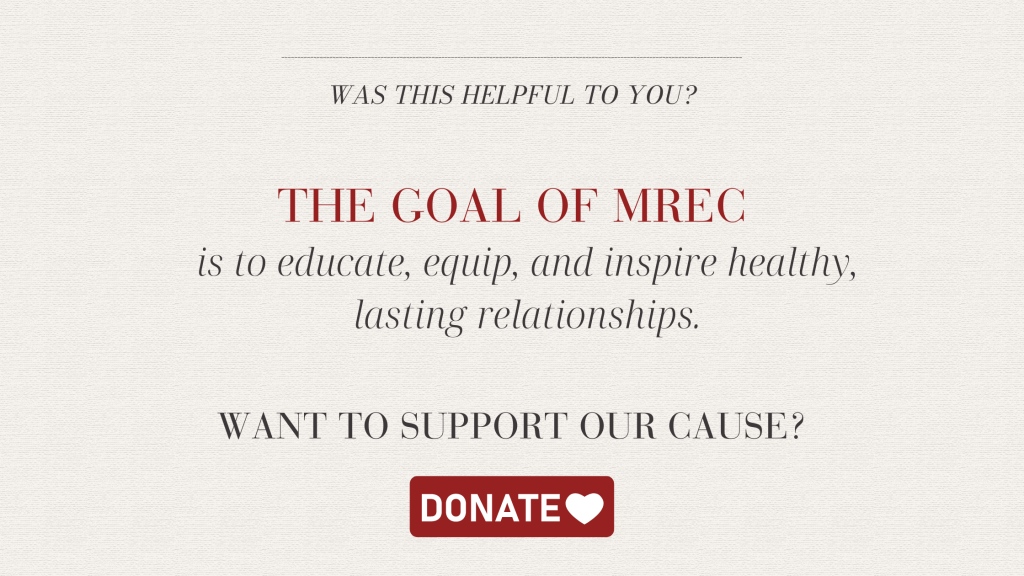- Written by The Marriage Relationship Education Center
Father’s Day may be over, but the importance of fathers will never go away.
In our current world, we need strong fathers more than ever.
When we say ‘strong fathers’, we’re not just referring to physical strength. We are referring to strength in how they lead their family, how they love, and the example they set — impacting generations to come.
It comes down to this — A father plays a unique role in a family that no one else can fill. Especially in a child’s life. Their development, emotional well-being, and who they will eventually become depends on it.
Studies & research back this up in every aspect.
The Three Roles of a Father
Fathers are monumentally important to a child’s well-being — both physically and psychologically.
Whether raising their biological children, entering the family as a step-parent, adopting a child, or even walking into the role of a stay-at-home dad — dads matter!
Studies show children who have a healthy relationship with their father or a father figure, tend to have strong levels of psychological health. They also seem to make better decisions when it comes to quality relationships.
In this recent article, Brenda Volling, a University of Michigan Psychologist, talks about the quality of father-child relationships.
“Some of us have been doing research on fathering and children’s development for nearly four decades and the research is clear here. What fathers do with their children, not simply how much time they are there with them, is incredibly important to healthy child development. It is the quality of the father’s relationships with his children that truly matters.”
Before we dig into these three roles of a father, it’s important to note that every family is different.
For some, the father may be supporting the family financially, and for others, it’s the mother heading out to work.
The dynamics are constantly changing. In your family, mom may have been the one staying home raising the kids, but in your family now, perhaps your husband is the one taking care of the kids.
It all comes down to the balance of mom and dad. How you support each other and how you raise your children together, as one.
Mothers and fathers bring different gifts and perspectives to the family, but today we’re focusing on dads.
And studies have shown that fathers take on one or more roles within a family. So we want to explore each of these and encourage dads – wherever they are currently and wherever they aspire to go as a dad.
1. THE PREPARER
Fathers should make their families feel safe.
Dads typically do this by teaching their children how to take care of themselves. It could be as simple as showing them how to swim, ride a bike properly, or even change a tire in case they are ever stranded.
2. THE PROVIDER
As the provider, a father fulfills his sense of duty and often finds his identity through the way he provides for his family.
Different cultures and different generations have their definitions of who should be the one to bring home the bacon and how. Today, many families have two incomes but it is still an important role the father plays.
If the wife is the breadwinner and something happens, dad steps in to be sure the bills are paid and the needs of the family are met. This allows him to fulfill that need as a provider.
3. THE DISCIPLINARIAN
Because fathers are typically trying to prepare their children for the future, they tend to have high expectations.
They often want to see their kids have what they never had, to be better off in life. To get them there, fathers teach their children how to show self-control, work hard, listen well, and deal with tough and unfair situations.
Much of the time, fathers play the role of disciplinarian.
It’s important to note that this is a healthy role if it’s done in a respectful, consistent, and loving manner. When a child is disciplined in love and learns consequences safely, they will thrive.
The Importance of a Loving Father
A father figure significantly influences the life of a child. It’s that profound and that simple.
If a father abuses any of his roles or is absent in his child’s life, every area of the child’s wellbeing is at risk, from mental health, education outcomes, relationships, and a multitude of life choices that can spiral out of control.
Children are vulnerable.
They are sensitive, easily influenced, and moldable.
The first father influence they have in their life will shape how they view men, fathers, relationships, and even their heavenly father.
Stats & Research
-
If a child has a strong and healthy relationship with their dad, they usually have higher self-esteem and stable relationships with men overall.
-
A recent study shows when there is more marital conflict, a child feels less attachment and protection from the father.
-
Research shows that children mimic the behavior around them, showing the importance of a father’s role in loving his family well.
-
This research shows the importance of involvement from a father.
-
Sixty-eight percent of teens say they want to spend more time with their fathers.
-
The percentage of absent fathers is climbing. 1 in 4 children lives in a home without a dad.
-
Early positive father involvement leads to greater academic success, more positive social behavior, fewer conduct problems, higher self-esteem, lower levels of depression, and reduced contact with the juvenile system.
The statistics don’t lie — fathers matter!
What Your Child Needs
From an early age, children are looking for stability and trust in this world of uncertainty.
When you invest in your family and show your kids that you are present, and support their mom, you provide emotional support, and protection — helping to form a bond that will last well into adulthood.
You’re setting the tone for building other healthy relationships that can influence their lives in big, big ways (friendships, dating relationships, and the workplace).
“When a father is active in a child’s life, particularly when they have a healthy relationship, that child grows up with a more positive identity and greater self-esteem. When a father is very present, this offers consistency and gives a child much-needed stability.” — Nicholas Hardy, clinical social worker and psychotherapist in Houston
Fathers and father figures — remember the influence you have!
Here are a few ways to consider:
-
A father’s strength can be powerful
-
His words can be inspirational
-
Hugs & affection from a dad can be deeply comforting and provide security
-
Quality time with a dad can be fun and motivating
-
A dad’s guidance can be foundational, life-giving, and life-saving — impacting their self-worth and quality of relationships their entire lives
-
Adventures with a dad can be exciting, memorable, and create a lifelong bond
Here at MREC, we believe that fathers and father figures matter more than ever in our world today!
So dads, remember this:
-
Set a good example for your children. It’s often said that our values are caught not just taught.
-
Love their mother well (remember those date nights)!
-
Respect those around you.
-
Step up, step out, and be a part of their lives.
-
Help with chores around the house. This models teamwork for your family.
-
Show gentleness and comfort in specific situations.
-
Discipline when it’s appropriate and teach consequences.
Need ideas, especially for spending time with your teenager? Check out this article!
How We Can Help
One of the biggest ways you can influence your family is to strengthen your marriage. When your marriage is strong, your children have the opportunity to see a healthy family dynamic.
Seeing mom and dad respect, love, and support one another will stay with them for a lifetime.
Marriage takes work, but it’s worth it! That’s why we want to help you and your spouse connect so that your family can thrive abundantly.
Learn more about the classes we offer:
-
Preparing for Marriage — for engaged couples, newlyweds, or seriously dating couples.
-
Adventures in Marriage — for married couples looking to connect, resolve conflict, and grow even closer.
-
Healthy Choices — workshop for students to learn healthy relationship skills.
Here at MREC, we believe in healthy and lasting relationships! Learn more about our purpose and mission in this video here.






